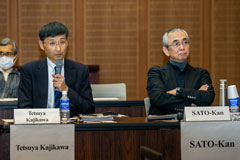Book Publication Seminar: What Is 'The Learning Enterprise for Quality Growth'?
2020.03.18
On Feb. 27, 2020, JICA Research Institute (JICA-RI) held a public seminar entitled "The Learning Enterprise for Quality Growth: Revisiting Kaizen Approach" at the JICA Ichigaya Building. In response to the COVID-19 epidemic, the event was held live on the internet.
Since 2017, JICA-RI has been conducting a joint research project with the Global Development Network (GDN), a network of researchers in developing and developed countries, on Kaizen, a Japanese-style productivity improvement and quality control method. In February 2020, a book entitled "Workers, Managers, Productivity: Kaizen in Developing Countries," which summarized the results of the project, was published.

John Page, the Brookings Institution
At the seminar to commemorate that publication, one of the editors, John Page, a senior fellow in the Global Economy and Development Program at the Brookings Institution, introduced the content of the book. Page said improving productivity and quality is essential for firms in developing countries to enter international markets through global value chains. Kaizen, which has been successful in Japanese firms, is key to raising the productivity of small and medium-sized enterprises (SMEs) in developing countries, he added. He explained that Kaizen will not only reduce costs, improve productivity and quality, and increase demand for products and services, but it will also grow a firm into a learning organization where management and workers share information to solve problems, which in turn will lead to sustained improvements in firm capabilities, referring to the case studies in the book.

Kajikawa Tatsuya, Central Japan Industries Association (left) and Sato Kan, IDE-JETRO
Next, Sato Kan, chief senior researcher, Institute of Developing Economies, Japan External Trade Organization (IDE-JETRO), commented on the book. He pointed out that the Kaizen method had a great effect not only on the manufacturing industry but also on livelihood improvement in rural areas during the postwar period and the high economic growth period in Japan, and asked the question, "When and at what kinds of firms is the kaizen approaches most suitable?" Tatsuya Kajikawa, director, Global Consulting Division, Central Japan Industries Association (ChuSanRen), pointed out that this book comprehensively summarizes case studies of Kaizen introduction in various countries, regions and business scales from the perspective of Kaizen training provider, and emphasized that Kaizen is not about removing the problem itself (correction), but about removing the root cause to prevent its re-occurrence of the problem to achieve higher quality and productivity (corrective action).
Subsequently, Ohno Izumi, JICA-RI director, moderated open discussion with the participation of the book's editors and contributors.
With regard to cases where Kaizen was used to improve firm capabilities, Filipe Lage de Sousa, who wrote Chapter 10, introduced the case of Brazil, where Kaizen led not only to productivity but also to product and process innovation, and Mili-Ann M. Tamayao, who wrote Chapter 13, introduced the case of the adoption of Kaizen by SMEs in the Philippines. Ishigame Keiji, Yokohama International Center at JICA, who wrote Chapter 9 on using Kaizen to enter the global value chain, introduced the case of a JICA-supported South African automotive parts company.

Discussion was held live on the internet
Furthermore, from the perspective of promoting the use of kaizen in developing countries, JICA senior advisor Homma Toru, who wrote Chapter 6, introduced the government- and corporate-led popularization patterns in Malaysia, Indonesia and Myanmar; Suzuki Momoko of the Africa Department at JICA and Sakamaki Eriko of the Secretariat of Japan Overseas Cooperation Volunteers at JICA, who wrote Chapter 7, introduced vocational training for students using Kaizen in South Africa and Ethiopia; and Jin Kimiaki of JICA-RI, who wrote Chapter 5, introduced the use of Kaizen to change the way of thinking of workers in Ethiopia and its ripple effects outside the workplace. The participants discussed a wide range of topics, including the importance of motivation to continue Kaizen activities and the use of e-learning, while comparing the situation in each country.
At the end of the seminar, Hosono Akio, senior research advisor at JICA-RI, gave a summary and concluded the seminar by saying that in recent years, "stakeholder capitalism," in which companies invest in solving environmental and social problems, is gaining momentum. Kaizen should not only improve quality and productivity, but also improve the motivation and skills of workers and the working environment, and in turn contribute to the social responsibility of all parties and companies concerned, including workers, suppliers and consumers, he said.

事業事前評価表(地球規模課題対応国際科学技術協力(SATREPS)).国際協力機構 地球環境部 . 防災第一チーム. 1.案件名.国 名: フィリピン共和国.

事業事前評価表(地球規模課題対応国際科学技術協力(SATREPS)).国際協力機構 地球環境部 . 防災第一チーム. 1.案件名.国 名: フィリピン共和国.

事業事前評価表(地球規模課題対応国際科学技術協力(SATREPS)).国際協力機構 地球環境部 . 防災第一チーム. 1.案件名.国 名: フィリピン共和国.

事業事前評価表(地球規模課題対応国際科学技術協力(SATREPS)).国際協力機構 地球環境部 . 防災第一チーム. 1.案件名.国 名: フィリピン共和国.

事業事前評価表(地球規模課題対応国際科学技術協力(SATREPS)).国際協力機構 地球環境部 . 防災第一チーム. 1.案件名.国 名: フィリピン共和国.
scroll